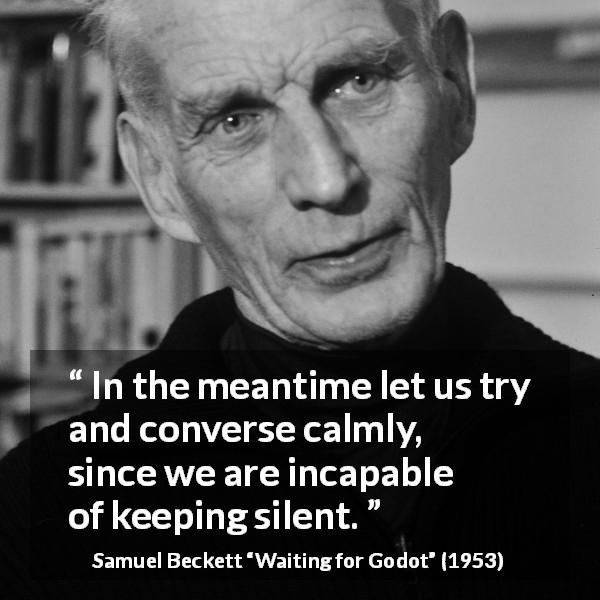

: 'The only thing I'm sure of is that they're wearing bowlers.' " "The bowler hat was of course de rigueur for men in many social contexts when Beckett was growing up in Foxrock, and commonly wore one." That said, the play does indicate that the clothes worn at least by Estragon are shabby. Roger Blin advises: "Beckett heard their voices, but he couldn't describe his characters to me. They are never referred to as tramps in the text, though are often performed in tramps’ costumes on stage. When Beckett started writing he did not have a visual image of Vladimir and Estragon. Vladimir and Estragon ( The Doon School, India, 2010) I told him that all I knew about Pozzo was in the text, that if I had known more I would have put it in the text, and that was true also of the other characters." Vladimir and Estragon He once recalled that when Sir Ralph Richardson "wanted the low-down on Pozzo, his home address and curriculum vitae, and seemed to make the forthcoming of this and similar information the condition of his condescending to illustrate the part of Vladimir. They decide to leave and return the day after with a rope, but again they merely remain motionless as the scene fades to black.īeckett refrained from elaborating on the characters beyond what he had written in the play. After the boy exits, Vladimir and Estragon consider suicide, but they do not have a rope with which to hang themselves. The boy states that he has not met Vladimir and Estragon before and he is not the same boy who talked to Vladimir yesterday, which causes Vladimir to burst into a rage at the child, demanding that the boy remember him the next day so as to avoid repeating this encounter once more. Soon after, the boy reappears to report that Godot will not be coming. Lucky and Pozzo exit shortly after their spirited encounter, leaving Vladimir and Estragon to go on waiting. Pozzo cannot recall ever having met Vladimir and Estragon, who themselves cannot agree on when they last saw the travelers. Pozzo has become blind and Lucky is now fully mute. Lucky and Pozzo eventually reappear, but not as they were previously. Vladimir and Estragon are again waiting near the tree, which has grown a number of leaves since it was last seen in Act 1. Vladimir and Estragon then announce that they will also leave, but they remain onstage without moving. Vladimir asks for descriptions of Godot, receiving only extremely brief or vague answers from the boy, who soon exits. Pozzo and Lucky soon depart, leaving the bewildered Estragon and Vladimir to continue their wait for the absent Godot.Įventually, a boy shows up and explains to Vladimir and Estragon that he is a messenger from Godot, and that Godot will not be arriving tonight, but surely tomorrow.
WAITING FOR GODOT SPARKNOTES TORRENT
Following Pozzo's command "Think!", the otherwise mute Lucky performs a sudden dance and monologue: a torrent of academic-sounding phrases mixed with pure nonsense.

Pozzo states that he is on the way to the market, at which he intends to sell Lucky for profit. Lucky is bound by a rope held by Pozzo, who forces Lucky to carry his heavy bags and physically punishes him if he deems Lucky's movements too lethargic. Subsequently, an imperious traveler named Pozzo, along with his silent slave Lucky, arrives and pauses to converse with Vladimir and Estragon. They are not certain if they have ever met Godot, nor if he will even arrive. The duo discuss a variety of issues at length, none of any apparent significance, and it is finally revealed that they are awaiting a man named Godot. Estragon notifies Vladimir of his most recent troubles: he spent the previous night lying in a ditch and received a beating from a number of anonymous assailants. The play opens with two bedraggled acquaintances, Vladimir and Estragon, meeting by a leafless tree. 4.6 Beckett's objection to the casting of female actors.In a poll conducted by the British Royal National Theatre in 1998/99, it was voted the "most significant English-language play of the 20th century". The English-language version premiered in London in 1955. The premiere, directed by Roger Blin, was on 5 January 1953 at the Théâtre de Babylone, Paris. The original French text was composed between 9 October 1948 and 29 January 1949. Waiting for Godot is Beckett's translation of his own original French-language play, En attendant Godot, and is subtitled (in English only) " a tragicomedy in two acts". Waiting for Godot ( / ˈ ɡ ɒ d oʊ/ GOD-oh) is a play by Samuel Beckett in which two characters, Vladimir (Didi) and Estragon (Gogo), engage in a variety of discussions and encounters while awaiting the titular Godot, who never arrives. Waiting for Godot, staging by Otomar Krejca, Avignon Festival, 1978


 0 kommentar(er)
0 kommentar(er)
